Algeria
Tens of thousands of Algerians took to the street on Friday, marking the ninth week of protests that led to the resignation of former president Abdelaziz Bouteflika.
Algerians first hit the streets in huge numbers on February 22 after Bouteflika’s announcement that he would stand for a fifth term in presidential elections that had been scheduled for Thursday.
Parliament named an interim president and a July 4 election date was set in a transition endorsed by the country’s powerful military. But Bouteflika’s April 2 exit failed to placate many Algerians who want to topple the entire, largely elderly elite that have dominated the country since independence from France in 1962.
Thousands of protesters gathered anew in city centres around Algeria demanding root-and-branch reforms – including political pluralism and crackdowns on corruption and cronyism, witnesses said, and more were expected after Friday prayers.
“We will not give up our demands,” said Mourad Hamini, standing outside his coffee shop, where thousands of protesters were waving Algerian flags.
Protesters also demanded Abdelkader Bensalah, head of the upper house of parliament, quit as interim president as well as interim Prime Minister Noureddine Bedoui.
“They must go. The Bs must go,” one banner read, referring to Bensalah, Bedoui, and Moad Bouchareb, head of the ruling party.
Who are the Bs?
Bouteflika’s departure early this month spurred demonstrators to seek further changes, notably the resignation of three senior Bouteflika allies.
Activists chalked up a second victory Tuesday as one of the three, constitutional council chief Tayeb Belaiz, followed Bouteflika to the exit.
But student Lyes Adimi, 24, said more change was needed.
“Just because Belaiz has resigned that doesn’t mean it’s over,” she said. “What has the constitutional council ever done apart from validating the fraud of the system it belongs to?”
Protesters are demanding the resignation of the two remaining members of a group dubbed the “3B”, interim leader Abdelkader Bensalah and Prime Minister Noureddine Bedoui, saying regime stalwarts should be entirely excluded from any political transition.
- Bouteflika Abdelaziz: resigned from position as president of the country
- Belaiz Tayeb: resigned as constitutional council chief
- Bensalah Abdelkader: yet to resign, currently interim president
- Bedoui Noureddine: yet to resign from role as prime minister
On Friday, hundreds rallied outside the capital’s iconic main Post Office building, chanting: “The people want them all to leave!” and “Barakat (Enough of) this system!”
Belaiz’s replacement, little-known senior judge and former prosecutor Kamel Feniche, is also seen as a regime loyalist.
Protesters want a clean break with “le pouvoir”, or the secretive establishment – veterans of the war of independence against France, the ruling National Liberation Front (FLN) party and associated oligarchs – and sweeping reforms.
“The ninth Friday is a vote against the gang,” read a banner held up by protesters. “The system will go sooner or later,” said Mohamed Dali, who was selling sweets to protesters.
Another banner read: “The country is ours and the army is ours.”
What is the army saying?
On Tuesday, army chief Lieutenant-General Ahmed Gaed Salah said the military was considering all options to resolve the national political crisis and warned “time is running out”.
It was a hint the military was losing patience with the popular upheaval shaking Algeria, a major oil and natural-gas exporter and a key security partner for the West against Islamist militants in north and west Africa.
Salah did not specify what measures the army could take but added: “We have no ambition but to protect our nation.”
The army has so far patiently monitored the mostly peaceful protests that at times swelled to hundreds of thousands of people. It remains the most powerful institution in Algeria, having swayed politics from the shadows for decades.
The army “is convinced that the crisis can be managed through appeasement”, said Geneva-based political scientist Hasni Abidi.
Police forces, accused in past weeks of trying to quell the protest movement amid teargas-soaked clashes with demonstrators, were keeping a low profile Friday.
Agencies




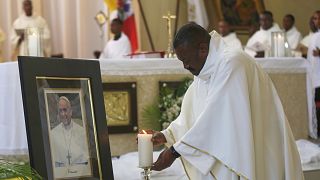
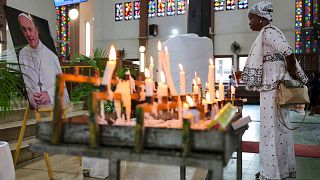
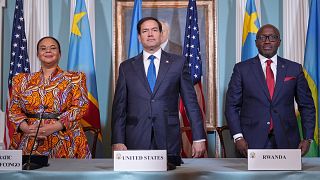
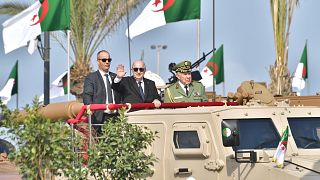
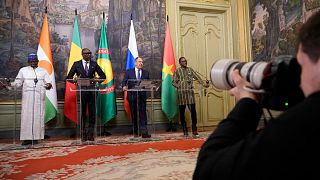
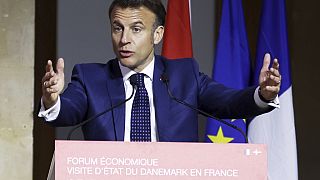
00:53
Algeria expels over 1,800 migrants to Niger in mass deportation
01:04
Algeria suspends flights to Mali over airspace violations
00:40
Tebboune and Macron commit to enhancing bilateral cooperation between Algeria and France
Go to video
Algeria sentences writer Boualem Sansal in France-Morocco dispute
22:26
Boxer Imane Khelif says unbothered by gender talk ahead of 2028 Olympics
03:12
Outgoing IOC chief defends women boxers at centre of Paris gender row